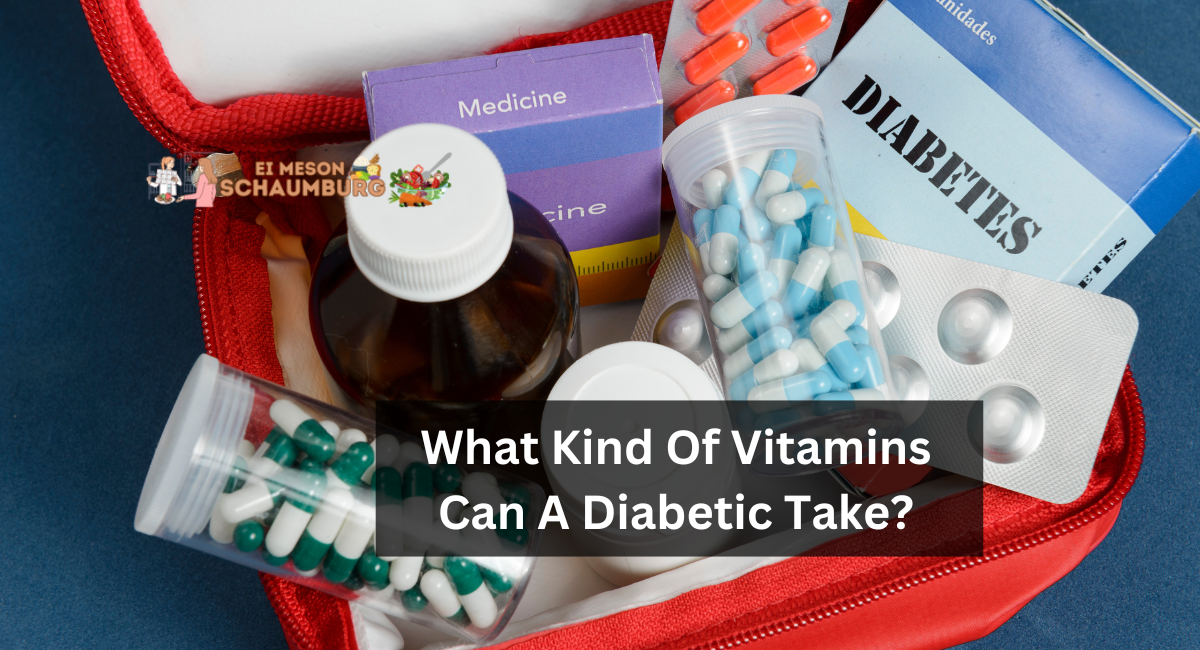Diabetes is a group of diseases that affect how the human body processes glucose in the blood, which is blood sugar. The situation is managed by maintaining blood sugar levels within a predetermined range to prevent complications. So, what kind of vitamins can a diabetic take?
Some evidence suggests that certain micronutrients may aid in the treatment of specific complications of diabetes. However, before taking supplements, individuals must consider potential drug interactions and safety concerns.
This article will discuss whether vitamins can help with diabetes and what the research says about famous dietary supplements individuals may wish to consider.
Do Vitamins And Supplements Help Diabetes Treatment?
Some individuals may contemplate taking vitamin and mineral supplements to increase their nutrient intake or to alleviate diabetes symptoms and complications. Certain dietary supplements can affect how the body processes and metabolizes glucose. However, additional research is required to determine whether vitamins can have antihyperglycemic effects.
The American Diabetes Association (ADA) advises individuals to consider whether a supplement is harmful. Some ingredients, for instance, may induce hypoglycemia, hyperglycemia or interact negatively with diabetes medications.
In addition, according to the Standards of Medical Care in Diabetes—2022, there is no conclusive evidence that dietary supplements containing vitamins, minerals, herbs, or seasonings can aid in managing diabetes. However, a physician may recommend supplements such as vitamin B12 or vitamin D if a person has a deficiency.
Why do people with diabetes need specific vitamins?
It’s not that individuals with diabetes cannot absorb vitamins or have digestive issues (unless they have gastroparesis, which is common among people with diabetes). Vitamins help people supplement their diets, particularly if they struggle to consume enough fruits and vegetables, and they are essential to living an active life if you have a chronic condition such as diabetes.
Always consult your physician, who may order blood tests to determine if you have vitamin deficiencies. You can choose the optimal supplement for your lifestyle with your care team.
What Kind Of Vitamins Can A Diabetic Take?
Here are many best vitamins for people with diabetes:
Thiamin (vitamin B1)
Those with type 1 or 2 diabetes are more inclined to have insufficient thiamin levels in their blood and have a higher risk of lacking thiamin than those lacking diabetes. This vitamin helps alleviate neuropathy discomfort.
Beef, pork, nuts, whole cereals, legumes, cauliflower, oranges, eggs, potatoes, asparagus, and kale are significant sources of thiamin.
Vitamin B12
Vitamin B12 is crucial for blood cell health and cognitive function. People with diabetes who have nerve injury in their hands and feet may experience a worsening of their symptoms if they are deficient in vitamin B12.
Long-term use of the diabetes medication Metformin has been shown to cause vitamin B12 deficiency.
Fish, milk, eggs, and meat products are all familiar sources of this vitamin. Vegetarians and vegans can also consume vitamin B12 orally.
Vitamin D
Vitamin D deficiency is linked with the onset of diabetes, and a Danish study found that chronically low levels of vitamin D in people with diabetes may raise the risk of death from diabetes.
Many people with diabetes also have low Vitamin D levels, so supplement your diet with plenty of egg yolks, liver, salmon, and dairy products fortified with the vitamin.
Regular sun exposure (10-30 minutes daily) can also increase Vitamin D levels.
Magnesium
Magnesium maintains an effective immune system, improves bones, regulates pulse rate, and aids digestion and utilization of nutrients from our daily foods.
This essential nutrient is commonly deficient in individuals with type 2 diabetes. Low magnesium levels have been linked to insulin resistance, and a study released in Diabetes Care found that regular magnesium supplementation may reduce the risk of developing type 2 diabetes.
Magnesium is typically consumed as a supplement with calcium and zinc, or You can find it in foods like legumes, rice, beans, nuts, green leafy vegetables, and wheat products.
Vitamin E
Vitamin E combats external contaminants, increases the effectiveness of insulin, and breathes the blood. Getting a Vitamin E vitamin can help avoid premature aging and cell damage, thereby reducing the risk of getting type 2 diabetes, and it also allows individuals with diabetes to maintain healthy blood sugar levels.
Almonds, avocado, nut butter, hazelnuts, sunflower seeds, and raw salmon are all rich in Vitamin E.
Vitamin C
Numerous people with diabetes have deficient vitamin C levels. Increasing one’s Vitamin C intake helps control glucose levels in the blood, which can be harmful at high concentrations and may contribute to diabetic complications such as retinopathy and kidney damage.
Vitamin C can also enhance insulin sensitivity, lowering blood sugar levels and enhancing Hba1c levels.
Many vegetables and fruits contain vitamin C, including kiwi, bell peppers, strawberries, guava, tomatillo, sweet potatoes, tomatoes, and spinach. Vitamin C supplements are also widely available.
Constantly collaborate with your medical professionals to determine the minerals and vitamins you should include in your diet.
Your physician will likely request a blood test to determine what is required, but having more minerals and vitamins in your diet can help you achieve improved blood sugar levels, lower Hba1c levels, and prevent short-term and long-term complications.
Cinnamon
Cinnamon has been traditionally used for medicinal purposes in Chinese medicine for centuries. Several investigations have been performed to investigate the impact on blood sugar levels.
A 2019 review of research indicates that cinnamon reduces fasting blood glucose levels. Cinnamon shows promise as a treatment for diabetes, according to preliminary research.
Chromium
Chrome is a necessary trace element. It is utilized in the breakdown of carbohydrates. However, research on chromium as a treatment for diabetes is limited. A 2020 evaluation of 28 clinical trials indicates that chromium supplements may assist people with type 2 diabetes lower fasting glucose levels.
Thiamine is soluble in water. However, benfotiamine, a thiamine supplement, is lipid-soluble. It penetrates cell membranes more readily. Several studies indicate that benfotiamine can prevent diabetic complications. Other studies, however, have not demonstrated any positive effects.
Acid alpha-lipoic
Alpha-lipoic acid, also referred to as (ALA) is a highly effective antioxidant. Research indicates that it could be:
- Decrease oxidative strain
- improve eyesight
- Alleviate nerve damage symptoms.
- Reduce fasting plasma glucose (FPG) levels.
However, additional research is required. In addition, you should consume ALA with caution because it can potentially cause dangerously low blood sugar levels.
Bitter melon
Bitter melon is employed in Asia, South America, and other regions to treat diabetes-related conditions. However, human data has been limited in recent years.
According to research conducted in 2020, bitter melon aided in the reduction of glucose levels in people with type 2 diabetes. Nevertheless, this investigation was relatively small. Before we can reach a conclusive conclusion, more research is required.
Green tea
Antioxidant polyphenols are present in green tea.
Epigallocatechin gallate (EGCG) is the principal antioxidant in green tea. According to laboratory investigations, EGCG may have numerous health benefits. Authentic Source that includes:
- Reduced risk of cardiovascular disease
- enhanced glucose control
- improved insulin function
- The antioxidant Resveratrol
Resveratrol is a compound present in grapes and wine. In animal studies, it prevents hyperglycemia. Studies on animals have also demonstrated that it can reduce oxidative stress, but data on humans is limited. It is too early to determine whether supplements assist with diabetes.
Thank you for reading….










